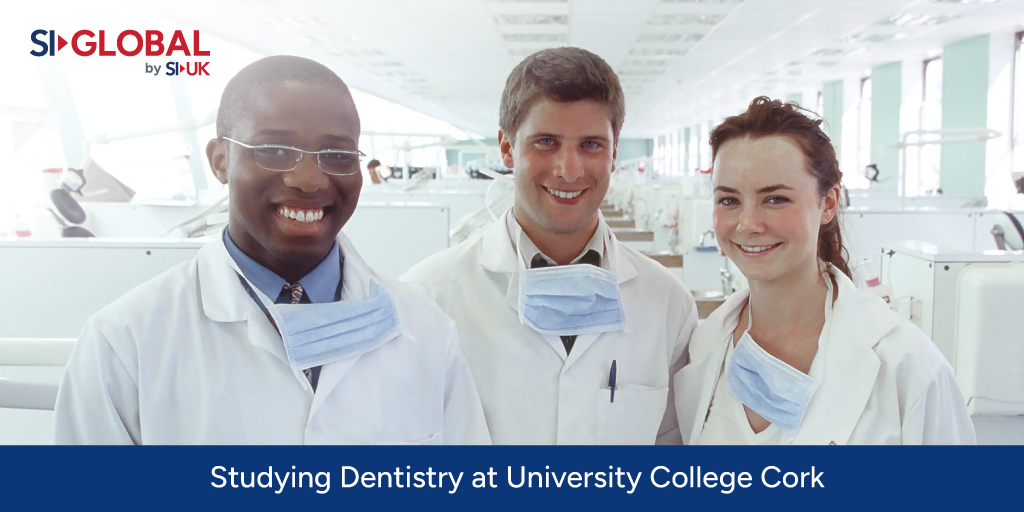Dentistry is a specific branch of medical science that focuses on diagnosing, preventing, and treating oral diseases and conditions related to the mouth and facial structures. As healthcare professionals, dentists play a crucial role in maintaining and improving people's oral health and engaging in a rewarding career.
The Bachelor of Dental Surgery (BDS) at University College Cork is a prominent dentistry course renowned for its academic excellence and accreditation. The undergraduate programme incorporates five years of rigorous training to enable students to become professional dental healthcare experts. As the educational experience provides an understanding of how to give clinical care to patients, it is considered to give students a rewarding career pathway.
During the five years, students can expect to receive technical knowledge through theory and clinical expertise via patient interactions. As the course progresses, they are given more opportunities to undertake clinical care of patients, which keeps becoming more complex and rewarding. Students are taught in small classes, allowing them to share their learning experiences with peers and the staff.
Learn more below about studying BDS at University College Cork, and begin your application by applying today.

Five Reasons to Study BDS at University College Cork
1. Great facilities
UCC is well-equipped to train students in a conducive learning environment. The 90-chair facility, situated on the campus of Cork University Hospital, allows students to benefit from laboratory teaching methods. The school also has other facilities to deliver education on each stage of the dental curriculum and provide specialized patient treatment.
2. Clinical exposure
One of the strengths of studying BDS at UCC is the emphasis on clinical exposure and practical training, which the students can get through the facilities. They also get the opportunity to apply theoretical knowledge in real-world clinical settings, honing their clinical skills under the guidance of expert faculty members. This practical approach ensures graduates are well-prepared for the demands of professional dental practice.
3. Profesional development
UCC emphasises professional development and provides career support to students. The dental school provides guidance on career pathways, facilitates networking opportunities, and prepares students for the challenges of entering the professional workforce. This commitment to the holistic development of students enhances their readiness for successful careers in dentistry.
4. UCC ranking and reputation
University College Cork is a prestigious Irish university that consistently ranks among the top universities in the country. It is ranked the 4th best university in Ireland in the QS World University Rankings of 2024 and is placed at the 292nd globally. At the Times Higher Education World University Rankings 2024, it is the 5th best Irish university among the top 301-350 global universities. In the latest Times Higher Education World Impact Rankings of 2023, UCC grabbed the 58th position out of 1,591 universities from across the globe.
5. Scholarships
Students pursuing dental education at the University College Cork can apply to get scholarship options, some of which are mentioned below:
- Government of Ireland International Education Scholarship
- Fulbright Scholarships
- UCC Sports Scholarships
Dentistry at Cork Facts
- Tuition Fees
International students pursuing BDS (Hons) must pay tuition fees of €50,000 in the 2024-2025 academic session.
- Faculties
The Cork Hospital Dental School & Hospital has an academic staff handling different modules. Many professors and consultants are specialised in their field of study, enabling them to impart high-quality education to students. Some of the prominent names are mentioned below:
- Prof Paul Brady- Dean, Consultant in Oral Surgery
- Dr Claire Curtin- Lecturer/Specialist Special Care Dentistry
- Dr Sharon Curtin- Lecturer in Behavioural Science
- Dr Cristiane da Mata- Lecturer -Restorative Dentistry
- Dr Keith Evans- Laboratory Lead Orthodontics
- Prof Mairead Harding- Deputy Director Oral Health Research Centre
- Professor Conor Barry- Consultant Oral MaxilloFacial Surgeon
- Entry requirements
International students, particularly the non-EU applicants to the course, are generally expected to have educational qualifications equivalent to the Irish Leaving Certificate. The Irish Leaving Certificate requirements entail that the students present at least six subjects with a minimum grade of H4 in two subjects and O6/H7 in the other four subjects. Mathematics, Chemistry, Physics or Biology and English are the major subjects needed. International students whose native language is not English must also present language proficiency results of standardised tests.
- Course structure
As the course is a five-year educational experience, students learn different modules that keep on progressing to give students a comprehensive knowledge base. The major modules taught during the course are mentioned below:
Year 1
- Principles of Human Structure for Dentistry
- Topographical Anatomy
- Introduction to Biomolecules and Metabolic Pathways
- Introduction to Physiology for Dentistry
- Fundamentals of Dentistry
Year 2
- Neuroanatomy and Embryology for Dental Students
- Mammalian Cell and Tissue Structure
- Dental Morphology, Histology, and Embryology
- Molecular Biology
- The Nervous System
- Physiology for Dental Students
- Foundations of Medicine
- Mechanisms of Disease
- Principles of Pharmacology
- Introduction to Clinical Dentistry.
Year 3
- Dental Pharmacology
- Manifestations of Systemic and Oral Disease
- Practical Restorative Dentistry
- Development of Clinical Skills
- Theoretical Basis for Clinical Dentistry
- Behavioural and Ethical Dental Practice
Year 4
- Clinical Medical Sciences in Dentistry
- Introduction to Dental Surgery
- Introduction to Oral Health and Development
- Clinical Adult Oral Health
- Theoretical Adult Oral Health
Year 5
- Dental Surgery
- Oral Health and Development
- Clinical Restorative Dentistry
- Theoretical Dentistry
- Career options
Students graduating with BDS can gain highly technical and advanced skills to pursue dental practice. The clinical training allows them to learn through hands-on experience, due to which many graduates are job-ready to pursue careers in dentistry. Some of them can also choose to pursue higher education after earning a bachelor's degree in dentistry. Still, qualified dentists can start their careers with dental jobs to work in hospitals, clinics, and community dental centres. They can also take up academic and research roles in universities and colleges and help contribute to the advancements in dental science.
Study Dentistry at University College Cork
If you want to study dentistry in Ireland, you can book a consultation with SI-Global to learn more about all your available study options.
FAQ
What are my options for practising dentistry in Ireland after finishing my BDS?
After completing BDS, you have several options for practising dentistry in Ireland. You can establish a private dental practice, work in established dental clinics or hospitals, contribute to public health dentistry programmes, pursue academic roles at dental schools or research institutions, or specialise in areas such as orthodontics or oral and maxillofacial surgery. Additionally, you must meet the licensing requirements and obtain registration with the Irish Dental Council to practise dentistry in Ireland.
Do Irish Dental Schools require interviews?
Some dental schools in Ireland conduct interviews in their admissions process.
What are the requirements for studying dentistry in Ireland?
The requirements generally depend on the level of education a student is going for. To take up an undergraduate degree, students must have educational qualifications equivalent to the Irish Leaving Certificate, and for the postgraduate programmes, a bachelor's degree in the relevant field is needed. English language proficiency is a must for international students at all levels.
How much are accommodation fees in Ireland?
Accommodation costs for students in Ireland can range from €7,000 to 10,000, depending on the city and lifestyle choices.









